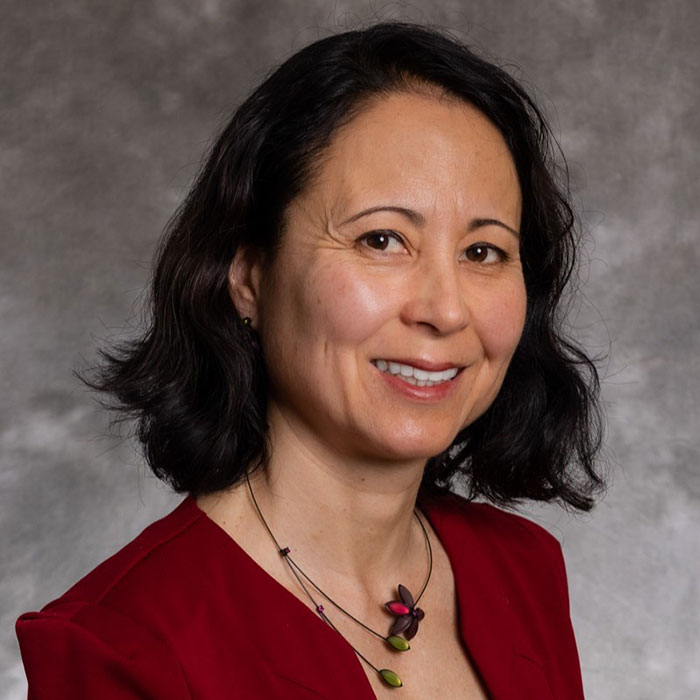Education
M.S., Biology
Johann Wolfgang von Goethe University
M.P.H., Health (Certificate in Nutrition)
Johns Hopkins Bloomberg School of Public Health
M.S., Marine Biology
University of Charleston
Ph.D., Biomedicine/Molecular Biology
Medical University of South Carolina
Areas of Expertise
Molecular Biology, Cancer Biology, Cancer Prevention, Nutrition, Selenium, Polyphenols
Biography
My laboratory primarily investigates the molecular mechanisms of colon cancer and
inflammation. In particular, the use of dietary compounds as preventive strategies
are of interest. Biological models utilized include in vitro (human and mouse cells, tissue samples) and in vivo (mouse) models. Current projects include:
1) The effects of the micronutrient selenium and the proteins in which selenium is incorporated,
in inflammatory colitis and colon tumorigenesis. Potential synergistic or antagonistic
mechanisms with other dietary compounds, such as the isothiocyanate sulforaphane,
are also investigated.
2) The effects of commonly consumed polyphenols in colon carcinogenesis and the hallmarks
of cancer. Potential synergistic or antagonistic mechanisms with other dietary compounds
are also of interest.
Additional interests include the intestinal/fecal microbiome of mammals. Currently,
we investigate the effects of dietary selenium, probiotics, or seasonal dietary changes
on the relative abundance of microbiota in a variety of mammals (domesticated, captive,
wild, or laboratory animals).
Publications
Fahey JW, Liu H, Batt H, Panjwani AA, Tsuji PA. (2025) Sulforaphane and brain health:
from pathways of action to effects on specific disorders. Nutrients 2025, 17(8), 1353.
Tsuji PA*, Santesmasses D, Lee BJ, Gladyshev VN, Hatfield DL (2021). Historical roles
of selenium and selenoproteins in health and development: the good, the bad and the
ugly. International Journal of Molecular Sciences 23(1),5.
Canter JA, Ernst SE, Peters KM, Carlson BA, Thielman, NRJ, Grysczyk L, Udofe P, Yu
Y, Cao L, Davis CD, Gladyshev VN, Hatfield DL, Tsuji PA* (2021). Selenium and the
15kDa selenoprotein impact colorectal tumorigenesis by modulating intestinal barrier
integrity. International Journal of Molecular Sciences 22(19), 10651.
Peters KM, Carlson BA, Gladyshev VN, Tsuji PA (2018) Selenoproteins in colon cancer. Free Radical Biology & Medicine pii: S0891-5849(18)30908-0.
Yim SH, Everley RA, Schildberg FA, Lee SG, Orsi A, Barbati ZR, Karatepe K, Fomenko
DE, Tsuji PA, Luo HR, Gygi SP, Sitia R, Sharpe AH, Hatfield DL, Gladyshev VN. (2018) Role of Selenof
as a Gatekeeper of Secreted Disulfide-Rich Glycoproteins. Cell Rep. 23(5):1387-1398.
Peters KM, Galinn SE, and Tsuji PA (2016). Selenium: Dietary sources, human nutritional requirements and intake across
populations. In Selenium: Its molecular biology and role in human health. (4th Edition) Hatfield DL, Schweizer U, Tsuji PA, Gladyshev VN, Editors. Springer Science+Business Media, LLC, New York, NY.
Galinn SE and Tsuji PA. Quercetin and kaempferol ameliorate inflammation through Nrf2 and other signaling
pathways (2016). In Broccoli: Cultivation, Nutritional Properties and Effects on Health. Juurlink B, Editor. Nova Publishers, Hauppauge, NY.
Additional Publications
Courses Taught
BIOL 200 (Intro to Cell Biology and Genetics)
BIOL 411 (Cancer Biology)
BIOL 655 (Biology of Cancer, graduate)
BIOL 796 (Professional Aspects, graduate)
BIOL 797 (Graduate Seminar)
Research Link
Research Gate
